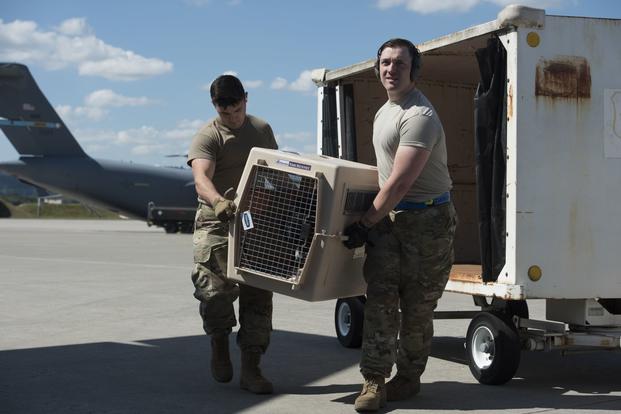The military's pet transportation allowance became effective Jan. 1, 2024. Originally authorized in 2022 as part of the 2023 National Defense Authorization Act, the Defense Department delayed implementation until this year due to budget constraints. But now it has happened!
What does this mean for you as a pet owner?
It means that you'll be reimbursed for some of the costs of moving one dog or cat when you move on permanent change of station, or PCS, orders.
This is going to be a big deal for pet owners, especially when moving overseas. Our family moved, with pets, from Hawaii to Australia to the U.S. to Italy to England and then back again.
That's six moves that qualify as OCONUS, or outside the continental United States. Over the course of those moves, we spent well over $10,000 on the costs of moving our pets.
These costs can be a significant financial burden on our military families.
What Orders Qualify for the Pet Transportation Allowance?
PCS orders are eligible for the pet transportation allowance.
The effective date of the orders must be Jan. 1, 2024, or later to be eligible for the reimbursement. This is not the date that the orders were written! Generally speaking, the effective date is the date that the service member is required to report to their new duty station, minus the number of authorized travel days plus one day. Confused? See this example sheet.
How Much Can You Be Reimbursed?
Reimbursement is for actual authorized expenses, up to a maximum. For moves within the continental United States (CONUS), the maximum reimbursement is $550. For moves OCONUS, the maximum reimbursement is $2,000.
This allowance applies only to one dog or cat per service member. If you have multiple pets, you can choose which pet's expenses to claim. You cannot combine costs for multiple pets, even if the total amount is less than the maximum reimbursement.
Dual military families are authorized reimbursement for one pet per PCS orders.
What Expenses Are Reimbursable?
Some expenses are reimbursable, regardless of whether the move is CONUS or OCONUS. Other reimbursable expenses are only for OCONUS moves.
These expenses are reimbursable for all moves, including CONUS and OCONUS:
- mandatory microchipping
- boarding fees
- hotel service charges
- licensing fees at the new permanent duty station
- pet shipping fees if the member flies rather than drives, or the pet is shipped separately from the member
For OCONUS moves, reimbursement also includes:
- quarantine fees
- Testing vaccine titer levels for entry
All costs must be "reasonable and substantiated." This means that they must be in line with the typical costs of the same service, and you need to have documentation, such as receipts. Your branch of service may have additional paperwork requirements to be reimbursed.
Availability of Government Transportation for OCONUS Moves
There is an important requirement for OCONUS moves. From the Joint Travel Regulations: "For transoceanic travel, use of Government or Government-procured transportation must be used if available or reimbursement for transportation costs is not authorized." Note the key phrase: "if available."
This means that you may be reimbursed for non-government travel if you get a non-availability statement from any available government travel, such as the Patriot Express. Non-availability statements should be requested from your transportation office.
The total reimbursement amount remains the same, even if you cannot use government transportation. This means that some families will still pay significantly out of pocket to ship certain animals OCONUS.
The complete rules are found in Chapter 5, Part A, Section 050107 of the Joint Travel Regulations.
This change is going to significantly reduce the financial burden of PCS moves for pet owners. I'm sure there will be some kinks to be worked out, but I'm excited that we've made it this far!
Keep Up With Military Pay Updates
Military pay benefits are constantly changing. Make sure you're up-to-date with everything you've earned. Subscribe to Military.com to receive updates on all of your military pay and benefits, delivered directly to your inbox.





